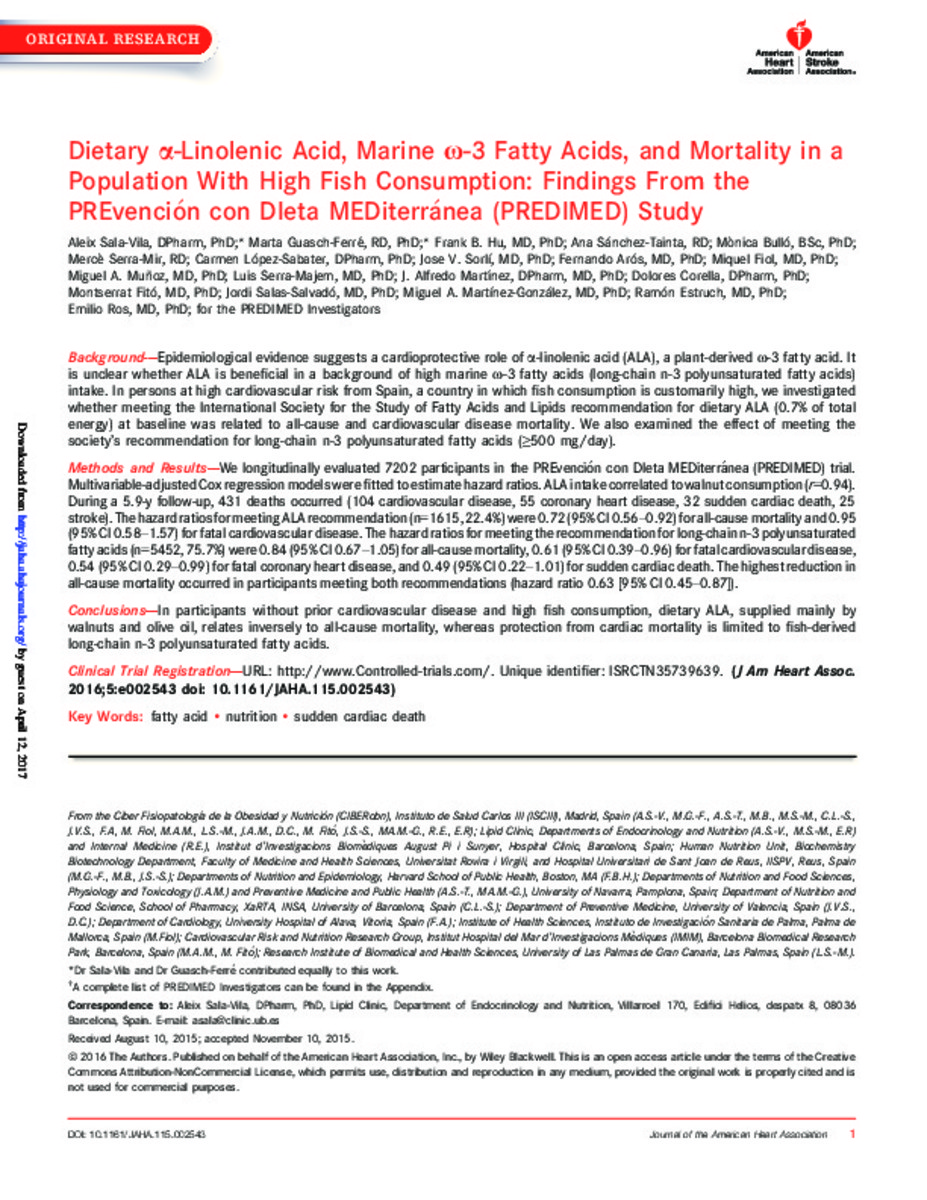Mostrar el registro sencillo del ítem
Dietary alpha-Linolenic Acid, Marine omega-3 Fatty Acids, and Mortality in a Population With High Fish Consumption: Findings From the PREvención con DIeta MEDiterránea (PREDIMED) Study
| dc.contributor.author | Sala-Vila, Aleix | |
| dc.contributor.author | Guash-Ferré, Marta | |
| dc.contributor.author | Hu, Frank B. | |
| dc.contributor.author | Sánchez-Tainta, Ana | |
| dc.contributor.author | Bulló, Mònica | |
| dc.contributor.author | Serra-Mir, Mercè | |
| dc.contributor.author | López-Sabater, Maria Carmen | |
| dc.contributor.author | Sorlí, José V | |
| dc.contributor.author | Arós, Fernando | |
| dc.contributor.author | Fiol Ramis, Miquel | |
| dc.contributor.author | Muñoz, Miguel Ángel | |
| dc.contributor.author | Serra-Majem, Lluis | |
| dc.contributor.author | Martínez, J. Alfredo | |
| dc.contributor.author | Corella, Dolores | |
| dc.contributor.author | Fitó, Montserrat | |
| dc.contributor.author | Salas-Salvadó, Jordi | |
| dc.contributor.author | Martínez González, Miguel Ángel | |
| dc.contributor.author | Estruch, Ramon | |
| dc.contributor.author | Ros, Emilio | |
| dc.contributor.author | Coltell, Oscar | |
| dc.contributor.author | PREDIMED Investigators | |
| dc.date.accessioned | 2017-04-24T09:18:12Z | |
| dc.date.available | 2017-04-24T09:18:12Z | |
| dc.date.issued | 2016-01 | |
| dc.identifier.citation | SALA‐VILA, Aleix, et al. Dietary α‐Linolenic Acid, Marine ω‐3 Fatty Acids, and Mortality in a Population With High Fish Consumption: Findings From the PREvención con DIeta MEDiterránea (PREDIMED) Study. Journal of the American Heart Association, 2016, vol. 5, no 1, p. e002543. | ca_CA |
| dc.identifier.uri | http://hdl.handle.net/10234/167248 | |
| dc.description.abstract | Background Epidemiological evidence suggests a cardioprotective role of α‐linolenic acid (ALA), a plant‐derived ω‐3 fatty acid. It is unclear whether ALA is beneficial in a background of high marine ω‐3 fatty acids (long‐chain n‐3 polyunsaturated fatty acids) intake. In persons at high cardiovascular risk from Spain, a country in which fish consumption is customarily high, we investigated whether meeting the International Society for the Study of Fatty Acids and Lipids recommendation for dietary ALA (0.7% of total energy) at baseline was related to all‐cause and cardiovascular disease mortality. We also examined the effect of meeting the society's recommendation for long‐chain n‐3 polyunsaturated fatty acids (≥500 mg/day). Methods and Results We longitudinally evaluated 7202 participants in the PREvención con DIeta MEDiterránea (PREDIMED) trial. Multivariable‐adjusted Cox regression models were fitted to estimate hazard ratios. ALA intake correlated to walnut consumption (r=0.94). During a 5.9‐y follow‐up, 431 deaths occurred (104 cardiovascular disease, 55 coronary heart disease, 32 sudden cardiac death, 25 stroke). The hazard ratios for meeting ALA recommendation (n=1615, 22.4%) were 0.72 (95% CI 0.56–0.92) for all‐cause mortality and 0.95 (95% CI 0.58–1.57) for fatal cardiovascular disease. The hazard ratios for meeting the recommendation for long‐chain n‐3 polyunsaturated fatty acids (n=5452, 75.7%) were 0.84 (95% CI 0.67–1.05) for all‐cause mortality, 0.61 (95% CI 0.39–0.96) for fatal cardiovascular disease, 0.54 (95% CI 0.29–0.99) for fatal coronary heart disease, and 0.49 (95% CI 0.22–1.01) for sudden cardiac death. The highest reduction in all‐cause mortality occurred in participants meeting both recommendations (hazard ratio 0.63 [95% CI 0.45–0.87]). Conclusions In participants without prior cardiovascular disease and high fish consumption, dietary ALA, supplied mainly by walnuts and olive oil, relates inversely to all‐cause mortality, whereas protection from cardiac mortality is limited to fish‐derived long‐chain n‐3 polyunsaturated fatty acids. | ca_CA |
| dc.description.sponsorShip | This study was funded in part by Instituto de Salud Carlos III (ISCIII) (Spanish Ministry of Economy) through grants RTIC G03/140, RTIC RD 06/0045, Centro Nacional de Investigaciones Cardiovasculares CNIC 06/2007, ISCIII FIS PS09/01292, the Spanish Ministry of Science and Innovation (MICINN) AGL2010‐22319‐C03‐02 and AGL2009‐13906‐C02‐02, and an unrestricted grant from the California Walnut Commission. Sala‐Vila holds a Miguel Servet I fellowship from the Ministry of Economy and Competitiveness through the ISCIII. | ca_CA |
| dc.format.extent | 15 p. | ca_CA |
| dc.format.mimetype | application/pdf | ca_CA |
| dc.language.iso | eng | ca_CA |
| dc.publisher | American Heart Association | ca_CA |
| dc.relation.isPartOf | Journal of the American Heart Association January 2016, Volume 5, Issue 1 | ca_CA |
| dc.rights | ©2017 American Heart Association, Inc. All rights reserved. Unauthorized use prohibited. | ca_CA |
| dc.rights | Atribución-NoComercial 4.0 España | * |
| dc.rights.uri | http://creativecommons.org/licenses/by-nc/4.0/ | * |
| dc.subject | fatty acid | ca_CA |
| dc.subject | nutrition | ca_CA |
| dc.subject | sudden cardiac death | ca_CA |
| dc.title | Dietary alpha-Linolenic Acid, Marine omega-3 Fatty Acids, and Mortality in a Population With High Fish Consumption: Findings From the PREvención con DIeta MEDiterránea (PREDIMED) Study | ca_CA |
| dc.type | info:eu-repo/semantics/article | ca_CA |
| dc.identifier.doi | http://dx.doi.org/10.1161/JAHA.115.002543 | |
| dc.rights.accessRights | info:eu-repo/semantics/openAccess | ca_CA |
| dc.relation.publisherVersion | http://jaha.ahajournals.org/content/5/1/e002543#sec-16 | ca_CA |
| dc.type.version | info:eu-repo/semantics/publishedVersion |
Ficheros en el ítem
Este ítem aparece en la(s) siguiente(s) colección(ones)
-
LSI_Articles [361]
Articles de publicacions periòdiques escrits per professors del Departament de Llenguatges i Sistemes Informàtics








